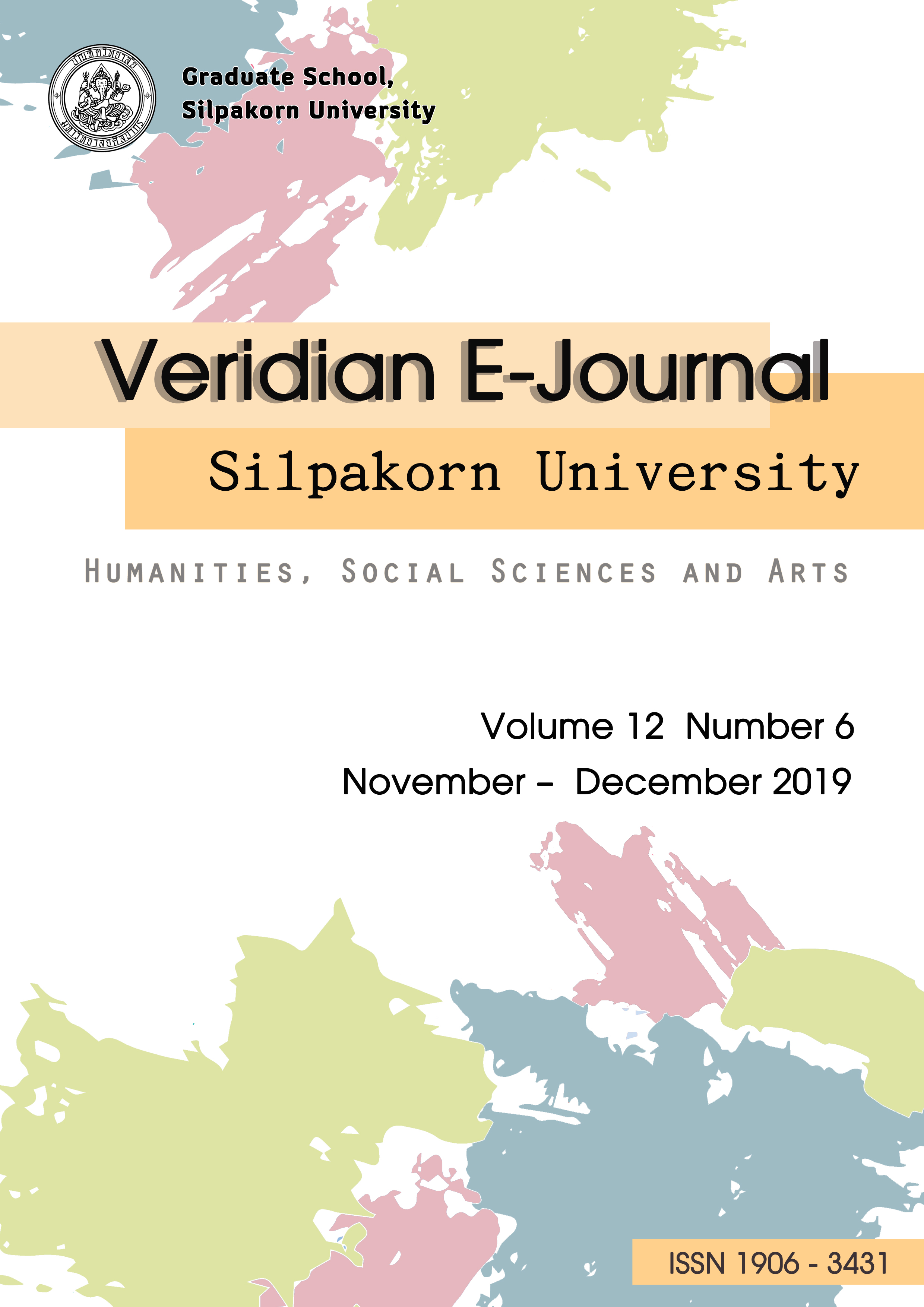รูปแบบความสัมพันธ์เชิงสาเหตุของปัจจัยที่ส่งผลต่อความตั้งใจซื้อสินค้าออนไลน์ผ่าน การพาณิชย์อิเล็กทรอนิกส์บนแพลตฟอร์มสื่อสังคม (A Causal Relationship of Factors Affecting Online Purchase Intention through E-Commerce on Social Media Platform)
Main Article Content
Abstract
การวิจัยครั้งนี้มีวัตถุประสงค์เพื่อศึกษาถึง 1) ปัจจัยเชิงสาเหตุที่ส่งต่อความตั้งใจซื้อสินค้าออนไลน์ผ่านการพาณิชย์อิเล็กทรอนิกส์บนแพลตฟอร์มสื่อสังคม และ 2) รูปแบบความสัมพันธ์เชิงสาเหตุของความตั้งใจซื้อสินค้าออนไลน์ผ่านการพาณิชย์อิเล็กทรอนิกส์บนแพลตฟอร์มสื่อสังคม เครื่องมือที่ใช้ในงานวิจัย คือ แบบสอบถาม ซึ่งพัฒนามาจากการทบทวนวรรณกรรม และการตรวจสอบความเชื่อมั่นโดยการทดสอบค่าสัมประสิทธิ์ครอนบาคอัลฟ่า แบบสอบถามได้กระจายแก่กลุ่มตัวอย่างซึ่งเป็นผู้ที่มีประสบการณ์ในการซื้อสินค้าออนไลน์ผ่านทางเว็บไซต์โซเชียลคอมเมิร์ซ จำนวน 230 คน จากนั้นทำการวิเคราะห์โมเดลการวัด และวิเคราะห์โมเดลสมการโครงสร้างก่อนการทำการตรวจสอบสมมติฐานด้วยวิธีการวิเคราะห์ข้อมูลสถิติแบบเส้นทางกำลังสองน้อยที่สุดบางส่วน (Partial Least Square: PLS)
ผลการวิจัยพบว่า ปัจจัยที่ส่งผลต่อความตั้งใจซื้อสินค้าออนไลน์ผ่านการพาณิชย์อิเล็กทรอนิกส์บนแพลตฟอร์มสื่อสังคมมากที่สุด คือ การประเมินถึงความรู้ความเข้าใจ รองลงลงมา คือ การประเมินถึงอารมณ์และความรู้สึก และความเชื่อมั่นในคำแนะนำผลิตภัณฑ์ ตามลำดับ โดยการเรียนรู้ข้อมูลจากคำแนะนำทางสื่อสังคมออนไลน์ (DE=0.412, P<0.01) การเรียนรู้ข้อมูลจากการอ่านการให้คะแนนและการรีวิวสินค้า (DE=0.333, P<0.01) และการเรียนรู้ข้อมูลจากการอ่านกระทู้และห้องสนทนา (DE=0.153, P<0.05) มีอิทธิพลทางตรงต่อการประเมินถึงความรู้ความเข้าใจ และการเรียนรู้ข้อมูลจากคำแนะนำทางสื่อสังคมออนไลน์ (DE=0.435, P<0.01) การเรียนรู้ข้อมูลจากการอ่านการให้คะแนนและการรีวิวสินค้า (DE=0.210, P<0.05) และการเรียนรู้ข้อมูลจากการอ่านกระทู้และ ห้องสนทนา (DE=0.209, P<0.01) มีอิทธิพลทางตรงต่อการประเมินถึงอารมณ์และความรู้สึก ในขณะที่การเรียนรู้ข้อมูลจากคำแนะนำทางสื่อสังคมออนไลน์ (DE=0.663, P<0.01) มีอิทธิพลทางตรงต่อความเชื่อมั่นในคำแนะนำผลิตภัณฑ์ นอกจากนี้ การประเมินถึงความรู้ความเข้าใจ (DE=0.346, P<0.01) การประเมินถึงอารมณ์และความรู้สึก (DE=0.322, P<0.05) และความเชื่อมั่นในคำแนะนำผลิตภัณฑ์ (DE=0.241, P<0.01) ยังมีอิทธิพลเชิงบวกต่อความตั้งใจซื้อสินค้าออนไลน์ผ่านการพาณิชย์อิเล็กทรอนิกส์บนแพลตฟอร์มสื่อสังคม ตามลำดับ และยังพบว่าการเรียนรู้ข้อมูลจากคำแนะนำทางสื่อสังคมออนไลน์ (IE=0.442, P<0.01) การเรียนรู้ข้อมูลจากการอ่านการให้คะแนนและการรีวิวสินค้า (IE=0.183, P<0.05) และการเรียนรู้ข้อมูลจากการอ่านกระทู้และห้องสนทนา (IE=0.120, P<0.05) มีอิทธิพลทางอ้อมต่อความตั้งใจซื้อสินค้าออนไลน์ผ่านการพาณิชย์อิเล็กทรอนิกส์บนแพลตฟอร์มสื่อสังคมโมเดลสมการโครงสร้างสามารถอธิบายผลของความตั้งใจซื้อสินค้าออนไลน์ผ่านการพาณิชย์อิเล็กทรอนิกส์บนแพลตฟอร์มสื่อสังคม ได้ร้อยละ 68.40 (R2=0.684, R2adj=0.680) จากผลการวิจัยเป็นประโยชน์ต่อผู้ประกอบการธุรกิจออนไลน์ผ่านการพาณิชย์อิเล็กทรอนิกส์บนแพลตฟอร์มสื่อสังคมในการเพิ่มระดับความตั้งใจซื้อสินค้า โดยผ่านการประเมินถึงความรู้ความเข้าใจ การประเมินถึงอารมณ์และความรู้สึก และความเชื่อมั่นในคำแนะนำผลิตภัณฑ์ ที่เกิดขึ้นจากการการเรียนรู้ข้อมูลจากคำแนะนำทางสื่อสังคมออนไลน์ การเรียนรู้ข้อมูลจากการอ่านการให้คะแนนและการรีวิวสินค้า และการเรียนรู้ข้อมูลจากการอ่านกระทู้และห้องสนทนา ตามลำดับ
This research aims to study 1) the factors that influence online purchase intention through e-commerce on social media platform and 2) a causal model in the online purchase intention through e-commerce on social media platform. The study used a questionnaire developed by reviewing the literature and testing the reliability using coefficient alpha. The questionnaire was distributed to 230 samples who buy products and goods from social commerce website. Then analysis the measurement model and structural equation modeling before hypotheses testing by Partial Least Square Structural Equation Modeling (PLS-SEM) with SmartPLS software.
The result showed that the most influential factor affecting online purchase intention through e-commerce on social media platform is cognitive appraisal, followed by affective appraisal, and trust in product recommendation, respectively. Learning from social recommendations (DE=0.412, P<0.01) had a statically significant direct effects on cognitive appraisal, followed by learning from rating and reviews (DE=0.333, P<0.01) and learning form forums and communities (DE=0.153, P<0.05), respectively. And Learning from social recommendations (DE=0.435, P<0.01) had a statically significant direct effects on affective appraisal, followed by learning from rating and reviews (DE=0.210, P<0.05) and learning form forums and communities (DE=0.209, P<0.01), respectively. Whereas learning from social recommendations (DE=0.663, P<0.01) had a statically significant direct effects on trust in product recommendation. Moreover, the cognitive appraisal (DE=0.346, P<0.01), affective appraisal (DE=0.322, P<0.05), and trust in product recommendation (DE=0.241, P<0.01) had a statically significant direct effects on online purchase intention through e-commerce on social media platform. Additionally, learning from social recommendations (IE=0.442, P<0.01), learning from rating (IE=0.183, P<0.05), and reviews learning form forums and communities (IE=0.120, P<0.05) had a statically significant indirect effects on online purchase intention through e-commerce on social media platform. The structural equation model can explain the effect to online purchase intention through e-commerce on social media platform at 68.40 percent (R2=0.684, R2adj=0.680). The results of this research are beneficial to online business entrepreneurs through e-commerce on social media platform to increase purchase intention through the cognitive appraisal, affective appraisal, and trust in product recommendation by learning from social recommendations, learning from rating, and reviews learning form forums and communities, respectively.

